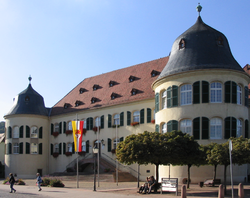Bad Bergzabern
| Bad Bergzabern | ||
|---|---|---|
 |
||
|
||
| Coordinates: 49°06′10″N 7°59′57″E / 49.10280°N 7.99913°ECoordinates: 49°06′10″N 7°59′57″E / 49.10280°N 7.99913°E | ||
| Country | Germany | |
| State | Rhineland-Palatinate | |
| District | Südliche Weinstraße | |
| Municipal assoc. | Bad Bergzabern | |
| Government | ||
| • Mayor | Harald Bratz (CDU) | |
| Area | ||
| • Total | 10.71 km2 (4.14 sq mi) | |
| Elevation | 170 m (560 ft) | |
| Population (2015-12-31) | ||
| • Total | 8,007 | |
| • Density | 750/km2 (1,900/sq mi) | |
| Time zone | CET/CEST (UTC+1/+2) | |
| Postal codes | 76887 | |
| Dialling codes | 06343 | |
| Vehicle registration | SÜW | |
| Website | www.bad-bergzabern.de | |
Bad Bergzabern (![]() listen ) is a municipality in the Südliche Weinstraße district, on the German Wine Route in Rhineland-Palatinate, Germany. It is situated near the border with France, on the south-eastern edge of the Palatinate forest, approximately 15 kilometres (9.3 mi) southwest of Landau.
listen ) is a municipality in the Südliche Weinstraße district, on the German Wine Route in Rhineland-Palatinate, Germany. It is situated near the border with France, on the south-eastern edge of the Palatinate forest, approximately 15 kilometres (9.3 mi) southwest of Landau.
Bad Bergzabern is the seat of the Verbandsgemeinde ("collective municipality") Bad Bergzabern.
Bad Bergzabern has a tradition as a holiday destination and contains various half-timbered houses from the seventeenth and eighteenth centuries. Of particular note from an earlier century is the Gasthaus Zum Engel (1579), which has been described as the most beautiful renaissance building in the entire region.
In the sixteenth century local scholars were keen to assert that the town had been founded under the Romans, and sources from this period refer to the medieval Latin name as "Tabernae Montanus". Although the area was indeed under the control of the Roman empire two thousand years ago, evidence does not support the notion that Bad Bergzabern had its own origins so far back.
In 1676, during the Franco-Dutch War, the French under Louis XIV infamously laid waste the Palatinate region as part of a scheme to enlarge France. Much of Bad Bergzabern was destroyed in the process. One of the few buildings that did survive the French king's torching of the town was the local duke's administrative office, which later became the Gasthaus zum Engel.
...
Wikipedia



